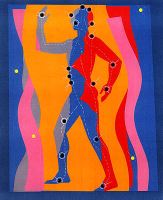Is Acupuncture Right for You?

Acupuncture is a health science used to treat pain and other dysfunctions in the body. This science began in China and has been used as a medical treatment for over 2,500 years. Although some in the West are still skeptical about the efficacy of acupuncture (I was, too, until I experienced it for myself!), it has gained popularity and acceptance in the U.S. in the last several decades.
What types of complaints can acupuncture be used to treat?
It is effective for treating many different conditions. Here are a few examples:
*Acute and chronic pain resulting from such things as diabetic neuropathy, sports injuries, or accidents
*Migraine and sinus headaches
*Cervical (neck) and shoulder pain
*Post-operative pain
*Insomnia, irritability, and anxiety
*Gastric or digestive problems and constipation
*Fatigue
*Fibromyalgia (general muscle pain)
Acupuncture has also been credited with helping with weight loss and smoking cessation, among many other things.
What makes this therapy even more effective is combining it with other alternative therapies such as nutritional supplements, enzymatic therapy, herbal therapies, and relaxation techniques along with lifestyle counseling and stress management.
What does acupuncture feel like?
Acupuncture needles are solid and extremely thin (about the width of a human hair). They are sterile and used only once and then discarded, so there is no risk of infection from this treatment. When the acupuncture needle contacts the energy channel at specific points on the body the sensation is felt as a mild to moderate dull aching sensation or a tingling sensation. This initial discomfort usually passes very quickly. In some cases, a very mild electric stimulation may be applied to the needles to increase the movement of the energy through the channels. After the needles are inserted, the patient simply relaxes for twenty minutes to an hour. (I like to provide some nice, soothing music and low lighting for my patients during this time–many patients get so relaxed that they even fall asleep!)
How many treatments are needed?
The number of treatments can vary between four to eight depending on whether the condition is chronic or acute. Acute problems generally require fewer treatments than chronic problems. In either case, it is important to note that a positive outcome is based on the consistency of the treatments.
How does acupuncture work?
The human body’s energy (call the “chi” in Chinese medicine) flows through meridians or channels that are normally balanced. The meridians can be likened to the flow of blood through the meridian blood vessels. If a disruption of energy flow exists, it can affect the entire body system, producing pain or symptoms throughout different areas of the body. Correction of this delicate balance corrects the body’s dysfunction or problem. (For another explanation of the physiology of acupuncture, click here.)
Is acupuncture supported by scientific studies?
There have been numerous studies done to determine how effective this treatment is at treating various types of complaints. According to the National Institutes of Health, from these tests “promising results have emerged, for example, showing efficacy of acupuncture in adult postoperative and chemotherapy nausea and vomiting and in postoperative dental pain. There are other situations such as addiction, stroke rehabilitation, headache, menstrual cramps, tennis elbow, fibromyalgia, myofascial pain, osteoarthritis, low back pain, carpal tunnel syndrome, and asthma, in which acupuncture may be useful as an adjunct treatment or an acceptable alternative or be included in a comprehensive management program.” For more information on this subject, visit the NIH web site.
Of course, in the end what is important is does acupuncture work for you? As with any type of medical therapy, different people respond in different ways. Your health care provider will work with you to determine if this will be an effective way to enhance your overall treatment protocol.
NOTE: Before receiving acupuncture, be sure that your therapist is properly licensed to perform this treatment. Licensed naturopathic physicians have passed national board examinations on acupuncture and are credentialed under their NMD status by the Naturopathic Board of Medical Examiners to perform acupuncture treatments.
